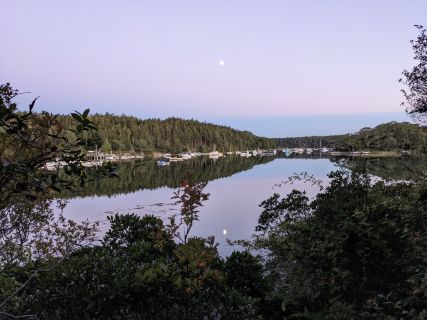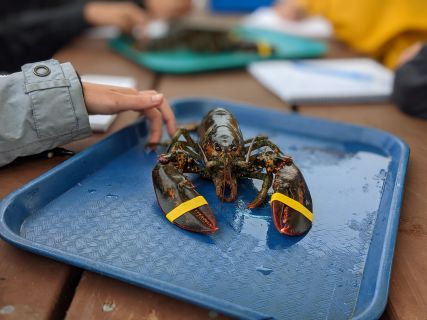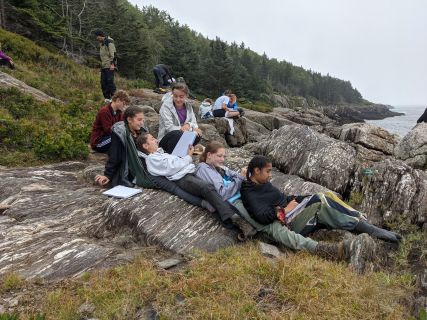

Integrating Science and Art with a Sense of Place: The Waldorf Senior Zoology Trip
Originally published in the Spring 2023 Renewal Magazine
 The sun has set, and the sound of the surf is heard just outside this empty wooden building. One hundred Waldorf seniors on this year's trip are out at the ocean's edge on the star-lit beach making ablution. They cleanse their hands, feet, and face in the cold ocean water, purify and calm their minds and then quietly open their senses to the nature of this island they will inhabit this week.
The sun has set, and the sound of the surf is heard just outside this empty wooden building. One hundred Waldorf seniors on this year's trip are out at the ocean's edge on the star-lit beach making ablution. They cleanse their hands, feet, and face in the cold ocean water, purify and calm their minds and then quietly open their senses to the nature of this island they will inhabit this week.
Slowly they re-enter the Kelp Shed, most holding the silence they were asked to keep. The room is dark, but a fire crackles loudly in the stone fireplace of this rustic, homey shed that serves as lodge for the summer campground. The rhythmical strumming of a guitar begins as the teachers sing a chant that has started each of these trips. "The earth ... the air. .. the water. .. the fire. .. return, return, return, return." As the music makes space, students join along singing, tentatively at first, but with growing confidence. Then silence. One teacher asks the group to imagine a picture of the quality of earth, and how it shapes this place and our lives. The rhythm of chant, silence, and picturing continues weaving through all four elements. Then silence. As the evening ends, the students and teachers file out to walk back to their campsites together. Another year of the senior zoology trip has begun.
Waldorf science education is rooted in a phenomenological approach. This means that observing phenomena is the key first step. Equally important is the reflective aspect of lessons where teacher and students grapple with previously made observations to come to meaningful relationships. We strive not just to fill the students with facts, but to awaken their capacities for observation, thinking, and artistic expression. Through engaged thinking, students are in the true process of "doing science," not just learning what other people have discovered. When taught well, science lessons awaken an interest in the world and in thinking more deeply about it. Doing this in the novel environment offered at Hermit Island on the Maine coast provides a capstone experience in the natural sciences. The artistic workshops connect the artistic realm to the scientific experience. Paintings, poetry, and observational drawings of marine invertebrates created by students in their field notebooks provide a true integration of art and science.
Student response to the trip has been enthusiastic. An international student from Ann Arbor told me. "I've seen all of the marine animals on TV. I felt like I knew everything about them. But when I interacted with them in the tide pools and observed the live animals under the microscope, I realized that I didn't really know anything. Now, I actually know them." Another student wrote a typical reflection about the week "I am tremendously grateful for this past week's endless opportunities. growth experiences, and lessons." Over the years, many have identified this as being a favorite experience of senior year.
 Recently, I had a conversation with Edward Edelstein, trip founder. His love for marine biology began while tide pooling and snorkeling for abalone on the coast of California as a high school student. As a biology teacher at Ontario's Toronto Waldorf School in 1993, Edelstein wrote a letter to all Waldorf High School biology teachers east of the Rocky Mountains proposing a senior trip to study marine zoology at Hermit Island, where he had vacationed with his family. He got only one positive response. Andy Dill from the Kimberton Waldorf School said he would give it a try and the first Hermit Island trip was launched with two schools in the fall of 1994.
Recently, I had a conversation with Edward Edelstein, trip founder. His love for marine biology began while tide pooling and snorkeling for abalone on the coast of California as a high school student. As a biology teacher at Ontario's Toronto Waldorf School in 1993, Edelstein wrote a letter to all Waldorf High School biology teachers east of the Rocky Mountains proposing a senior trip to study marine zoology at Hermit Island, where he had vacationed with his family. He got only one positive response. Andy Dill from the Kimberton Waldorf School said he would give it a try and the first Hermit Island trip was launched with two schools in the fall of 1994.
Year by year, attendance grew. At its pre-COVID peak there were 17 schools and over 240 students attending over two weeks. Over the past quarter century, several thousand Waldorf seniors have participated in this unique experience.
Zoology has always been at the heart of the trip, not just in the scientific work, but also in such details as the subjects of artistic projects, names of lab groups, and orchestration of evening campfires. Each day, one of the key invertebrate animal phyla (mollusks, annelids, arthropods, and echinoderms) forms the topic for the main lesson presented by collaborating teachers from each school.
Our study is deepened during the daily tide pool, microscope, and ecology labs, which are balanced by artistic workshops. Tidal rhythms sometimes require pre-dawn marches to the rocky shore so the students can experience the tide pools at a 6:00 a.m. low tide. These activities encourage students to enter genuinely into the context in which the marine invertebrates thrive. Experiencing them in their environment is key to understanding these animals. Hermit Island, with its unusual diversity of habitats, allows us to experience not only the animals in the context of their homes, but the amazing beauty of nature on this Maine coast.
An alumna of the class of 2013 recently shared the following reflections from her trip 10 years ago. "Hermit Island was a huge trip for me. I had never seen an ocean until we pulled up to Hermit Island. That alone was life changing. I had always wanted to experience being by an ocean so close to that expanse of water that is wild and calming and vast. [The trip] opened the senior year in such a unique way. It set that school year apart, making it special from the beginning. It allowed us to connect with people from other Waldorf schools. It allowed us to really bond as a group, away from the rest of the school. I don't have a single bad memory from that trip. I remember it in music, in the book whose author came to speak that I immediately bought at home, in sunshine, mud, pine trees, porcupines fighting in the trees, feeling free. I remember sitting alone on a cliff on our reflection morning and feeling so happy in that place.”
The opening evening ablution and elements circle sets the tone for the week. Sitting at the computer reflecting on the trip, the simple chant echoes on in me. "The earth, the air, the water, the fire, return, return, return, return.” These four elemental qualities contain deep wisdom. When I think of Hermit Island, the pictures of those qualities arise in me: sand, rock, and mud beneath our feet as we explore the different ecosystems; wind raising the surf and bringing the freshness of the ocean's salty water; cold tide pools, home to periwinkles, sea urchins, tunicates, crabs, and sea stars; the fiery sun warming us in the early morning's chill; the crackle of the evening's campfire, calling us to share and listen.
If you ask one of the students who attended the trip, “What happened in Maine?” you may get many answers, but key among the themes I have found are transformation, connection, joy, and amazement. We will continue sharing this experience with other Waldorf students and teachers as we return for another trip in September 2023.
.jpg/PXL_20210913_144803431(1)__427x320.jpg)

